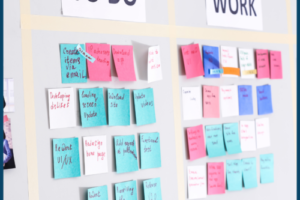
3 Strategies to Move From Thinking to Doing
Pondering what to do next or how to get a task done? My guess is that you are since you’re reading this post rather than working on something!
I, myself, am a great overthinker!
Sometimes we convince ourselves that time spent deliberating is actually time spent in planning or preparation.
At times this may be true. However, sometimes too much thinking actually leads to inaction.
Here are some examples:
What will you do first?
You know that regular exercise, eating better, and creating a daily mindfulness practice will help you manage your ADHD better. You know each of these undertakings requires you to adjust or establish habits and starting them all at the same time would be overwhelming
You decide to write a pros and cons chart for each activity, hoping that it’ll become clear which one to work on first.
When you’re done, it seems that you’d have the most success with instituting a consistent mindfulness routine. As you consider this, you decide that you’d like to get a second (or third) opinion from someone you trust. Then just to make sure, you do a cost analysis of what you would need to purchase for a mindfulness practice versus the equipment you’d need for an exercise routine (which came in second on the pros and cons chart).
When you make your final choice, you realize that if you’d just stayed with the mindfulness practice, the time you’d taken to “make sure” it would be the right decision could have been used to determine the when, where, and how so that you would be ready to start.
How will you complete that task in a timely manner?
How many times have you started a task (or project), only to go down a rabbit hole of research? Then you have lots of information and you aren’t sure what to use. So while you have long debates with yourself (or your team, depending on
the task), the deadline is just around the corner.
As you put in long hours to get the assignment finished on time, you recognize that if you’d set incremental deadlines, it would have been easier to stop researching and start the other parts of the project.
WISDOM
Eva Young: “To think too long about doing a thing often becomes its undoing.”
Cyril Northcote Parkinson: “Work expands so as to fill the time available for its completion.” (This is commonly known as Parkinson’s Law.)
I probably don’t need to remind you that overthinking leads to stress, frustration, lack of sleep, etc.!
So how can you move from “thinking” to “doing”?
#1 Determine the importance of the activity. Is it a bill that’s due this week or an item a customer is expecting tomorrow? Is it research to find a medical specialist or scheduling your regular dental appointment? Is it a gift that’s already late or a response to an email you received a month ago?
In your mind, each obligation may feel equally crucial. However, when you look at the consequences, you’ll probably find that one or two assignments have higher importance than the others.
Having difficulty determining the importance? First, consider which tasks might be delegated, delayed, or deleted altogether. Then, it may be easier to rank the rest.
#2 Diagnose the issue. Beyond importance dictating when an activity must be finished, what other factors are causing your stuckness or even avoidance?
Uncertainty. You may need to clarify the task or the expectations. You might require additional information.
Overwhelm. Perhaps one endeavor feels like it will take “forever.” Maybe the total number of obligations feels like they’ll never end.
Dislike. Maybe you don’t like or aren’t interested in the work. It could be that the project requires skills that you feel you don’t possess.
Boredom. Let’s face it, there are some jobs that just aren’t exciting. While you can’t always “make them” exciting, there are other tactics you can use to make them more palatable.
Once you understand the issue(s) that are holding you back, it’s easier to figure out how to move forward.
#3 Decide to take one small step. We often confuse tasks with projects. A task is one small, incremental action. It takes a limited amount of time and is often part of a larger project. A project is made up of multiple tasks. Sometimes these tasks must be completed concurrently in a short amount of time. Other times you can work on these tasks over a longer amount of time and in an order of your choosing.
Either way, taking a mini step engages your brain and helps your momentum.
Bottomline: overthinking gets in the way of completing tasks. This may lead to anxiety, irritation, loss of time for other activities, and more.
To avoid the “pondering cycle” determine the importance of your duties, diagnose what’s holding you back, and decide to take one tiny step forward.
Using this scale of 1-5, put a number in the comments to indicate your “deliberation degree.”
1 = “I never overthink.”
2 = “I rarely overthink.”
3 = “I overthink on about 50% of my activities.”
4 = “I overthink more often than not.”
5 = “I am the queen (or king) of overthinking!”
Feel free to leave an additional comment or question about moving from thinking to doing.



